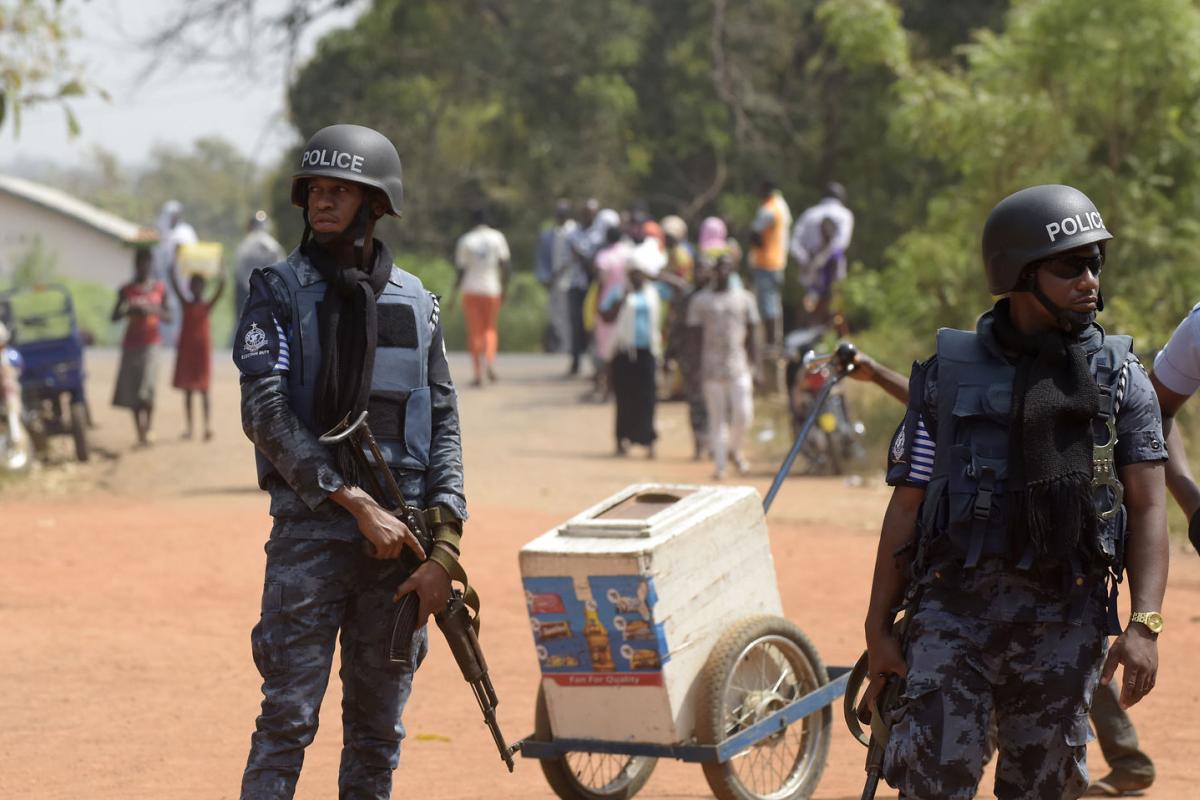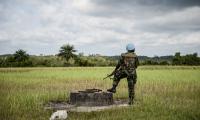
Creating security but what about peace?
Is having security the same as having a sense of peace? After a research trip to the towns of Bimbilla and Gushiegu in northern Ghana, researcher Peter Narh from the University of Ghana found the answer to be no! Even though conflicts over resources and chieftaincy can be mediated and often resolved by state security personnel, the notion of living in a peaceful community with trust among neighbours is something quite different – and something that must come from within the community itself.
Security, peace, peacekeeping, are terms that fly around in conflict prone areas in Ghana. The police, military, youth, farmers, community leaders or just anyone experiencing or affected in some way by tension in the major conflict areas of Ghana can confirm that these terms are of crucial importance. But where does peace and security come from to be kept? Who or what produces peace and security and for whom?
As a member of the research team exploring the domestic security implications of UN Peacekeeping in Ghana (D-SIP), I hoped to find some answers to the above questions in Bimbilla and Gushiegu in northern Ghana. In both communities, it is quite evident from everyday discussions among community people, state agencies, and some traditional and religious authorities (community leaders) that peace and security emanate not only from community norms, and one’s own efforts to keep oneself safe from one’s neighbour. Indeed, there is a division of labour between state agencies and community leaders when it comes to the production of peace and security, respectively.
Bimbilla and Gushiegu
Bimbilla is a rural town in the Northern region of Ghana. Its people are mainly traditional, with relationships structured by cultural and religious norms. Livelihood is dominated by small-scale agriculture (crop and livestock farming) by indigenous and settler farmers and itinerant livestock keepers. Major conflicts in Bimbilla occur around contestations over access to farmlands and water, among the different farmers, as well as over who the rightful heir to the Bimbilla chieftaincy stool is.
Gushiegu is also situated in the Northern region of Ghana, and is similar to Bimbilla in terms of context, except that here chieftaincy conflicts do not occur. In both communities, agriculture dominates the economy. Thus, it should not be surprising that over the years, intra and inter-ethnic differences surrounding access to and control over agricultural and grazing lands and water between farmers and livestock herders result in dire conflicts. In response, state security institutions have been deployed to enforce security and peace.
Division of labour A cross-section of people in Bimbilla disclosed in qualitative interviews that national police and military personnel are regularly present in the communities, especially in Bimbilla and at a lower scale and frequency in Gushiegu. People in both communities are emphatic that security personnel should deal severely with anyone found to engage in or incite to violence. In both communities the security apparatus operates through Municipal Security Committees (MUSEC). Simmering and manifested violence, whether over land and water rights, chieftaincy, or politics that MUSEC considers to endanger people’s lives and property or disrupt daily life in the community, are promptly confronted and quelled. It would not be an exaggeration to say that everyone in these communities is grateful for this security production.
Thus, peace, according to community people, can only evolve over time, not simply through the production of security by the state machinery
Nonetheless, community people do not necessarily associate production of security with peace. Tension can be felt in Bimbilla and Gushiegu even with the presence of armed security and their sometimes-uncompromising stance towards those fomenting violence. During the interviews, some community people lament that peace is yet to be re-established, despite the heavy presence of state-sanctioned security personnel. Neighbours often live with each other in suspicion and readiness that violence could flare up any time. Thus, peace, according to community people, can only evolve over time, not simply through the production of security by the state machinery.
Though people experience tense encounters with leaders at the local level, communities in general look towards their community leaders – chiefs and religious elites – to help bring about peace. What I refer to as a committee of eminent community leaders (CECL) therefore exists in each community to promote peace, and the MUSEC in the two communities analysed here acknowledges the relevance and capacity of the committee to play this role. This is in recognition by the MUSEC that local norms and traditions of peace are essential institutions that define and influence social cohesion in the communities. Nonetheless, the MUSEC confirms that community leaders are not part of MUSEC’s formal membership but are called on to ‘talk to the people’ to eschew violence and embrace peace.
Boutros Boutros-Ghali, UN Secretary-General during the 1990s, defined UN peacekeeping as the deployment of a United Nations presence in the field with the consent of all the parties concerned
Obviously, the two bodies, MUSEC and CECL, are associated with different roles – MUSEC is for security while CECL is for peace! Indeed, MUSEC appropriates for itself the frustrating role of producing security while CECL carries itself as a custodian of peace. Encouraged by MUSEC, CECL also regularly interacts with different groups in the community to shun conflict and tolerate each other as a commune in accordance with traditional and cultural norms. Moreover, CECL mediates conflicts as far as it can and offers traditional norm support for MUSEC in conflict resolution.
While this division of labour appears commonplace, it renders relevant the question of whether, in the context of D-SIP, soldiers and police officers who have served as UN personnel, christened as ‘peacekeepers,’ and whose experiences D-SIP has set out to identify, provide security as in MUSEC style, or support the production of peace as in CECL style. It appears to this author that MUSEC (with CECL) and UN Peacekeeping operations conceptualise the production of security and peace differently. While MUSEC may be reflecting experiences from UN peacekeeping, it approaches security as externally produced, while peace can only be established internally.
UN peacekeeping, by its name, sees security and peace as two inseparable processes that can be produced through external intervention. Boutros Boutros-Ghali, UN Secretary-General during the 1990s, defined UN peacekeeping as the deployment of a United Nations presence in the field with the consent of all the parties concerned, normally involving United Nations military and/or police personnel and frequently civilians as well, for the prevention of conflict and the making of peace. This definition informs the paradigm of UN peacekeeping, where security personnel are expected to deliver peace with the ‘consent’ of the conflicting parties. Note that the phrase ‘with the consent of all parties’ connotes a cooperative but primarily external production of what peace is thought to be.
While traditional and cultural norms of communities are less emphasised in the definition of UN peacekeeping, production of security by this formal security set-up is meant to construe peace. Yet, the cases of Bimbilla and Gushiegu suggest that the formal security setup alone may not necessarily deliver peace. The two communities acknowledge and appreciate the presence of formal security actors, but they derive peaceful co-existence from upholding their traditional and cultural norms of solidarity and cohesion. Security may be provided by an external source, such as MUSEC, but peace evolves from within a people, and is the result of deliberate efforts to evoke and uphold traditional norms of solidarity and coexistence.
Security may be provided by an external source but peace evolves from within a people
The storyline of this blog indicates that state-sanctioned security personnel may learn new conceptions of peace from communities that experience conflict. To explore the implications of UN Peacekeeping for domestic security and peacebuilding, questions must be raised, and answers found, in the first place, to whether there is a shared notion of security and peace among all actors (community people, formal security personnel, political authorities). Also relevant is the role of local traditional and cultural norms within formal security structures, and whether security and peace can endure after the military and police leave the area.
About the author
Peter Narh, PhD, is a sustainability scientist and Research Fellow at the Institute of African Studies at the University of Ghana. His research focuses on environmental, social and economic sustainability in West and East Africa, particularly in Ghana and Kenya. He is part of the research programme Domestic Security Implications of Peacekeeping in Ghana (D-SIP).

